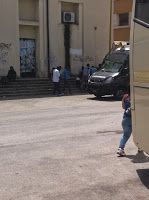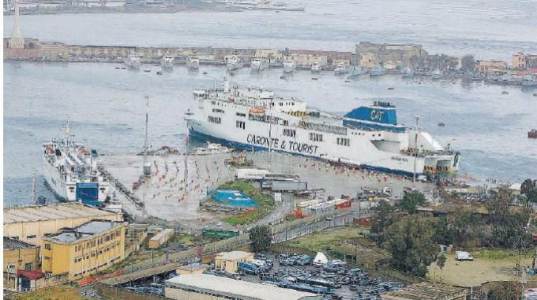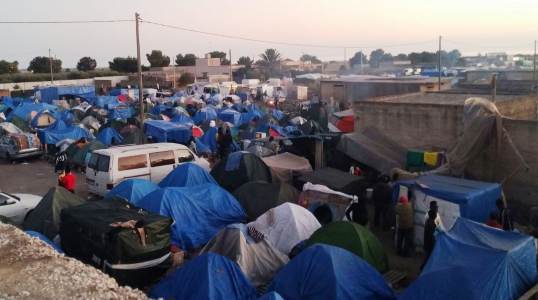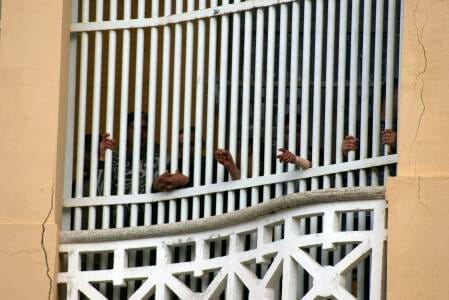The bodies at the bottom of the ocean are not part of the market
The latest shameful episode in Europe’s
immigration system concerns the treatment of those who have lost their lives at
sea. According to Salvi, the public prosecutor, the 900 bodies from recent
tragedies will not be recuperated from the sea due to the high costs of such an
operation. The problem has instead been passed on to the government, which,
with its standard hypocrisy, has stated, “everything that can be done will
be done in order to try and recuperate the bodies of our brothers and
sisters,” ( Renzi, Prime Minister). First we kill them and then we let
them rot at the bottom of the sea, erasing all traces of any wrongdoing,
convinced that any memories of innocent lives will also disappear from our
consciousness.
BROTHERS & SISTERS? How can we call them
brothers and sisters when we continue to exploit them and rob their cities of
origin and kill them in the dessert or at sea?
For the victims of the Costa Crociera cruise
ship off the island of Giglio, the investigations have been advancing for some
time now, and rightly so, and no one has ever questioned the costs. Many people
died in that tragedy, people who actively contribute to the economy. The people
of that tragedy are not the brothers and sisters of Renzi’s second division;
nor are they people in search of freedom, who with great courage (brought about
as the result of desperation) try to get through Europe’s strong fortress; nor
are they people who by migrating automatically denounce a system of oppression
which world powers try to keep hidden.
Even if we don’t believe the European
politicians and their hypocritical words, having stated that the shipwrecked
bodies will be reclaimed from the sea, we are lying in wait for Renzi, counting the days and waiting for the
moment when the bodies are found.
In Sicily new reception centers are being opened
to increase the number of places available. The
new structures will not have the state run direct system of reliability, as in
the past, but the conventions will be decided by the government’s famous invitation
to tender set out last year (Interior Minister Notice- Department for Civil
Liberty and Immigration- n. 7418, 20 June 2014 & n. 5484, 27 June 2014). As confirmed to us on the quiet by the Sicilian
Prefectures, the delay has been due to the dubious authority of some of the
‘characters’ involved in these new immigration businesses.
Whilst waiting for the reception system to expand in Sicily, migrants
are being sent to other parts of Italy (excluding Calabria and Puglia where
possible), in order to avoid concentrating funding in the hands of few.
Nonetheless we have already learnt that ‘mafia capitale’ has no borders or
barriers when it comes to making agreements to make money off the back of the
migrants.
Encouraged by the knowledge that the national
reception system has been inundated, many have attempted their luck by
particpating in public tenders. Yet luckily those not meeting the requirements have
been excluded. Nonetheless, those meeting the anti-mafia prerequisites have
been awarded contracts even if, in some cases, such groups have had absolutely
no experience whatsoever of working in the immigration sector. The lists
contains names of new associations and cooperatives who have never worked in
any capacity with the reception of migrants, having completely different professional
backgrounds. As in the past this type of situation is likely to cause several
problems, as has been seen in Marsala. Two new centres have recently been
opened there, revealing a total lack of basic knowledge about how a reception
centre should be run.
Another phenomenon is that of awarding conventions
to the ‘renown few’ who have held the oligopoly of reception in Sicily for many
years, often with less than convincing results- to name a few: Sol.co (present
in Palermo and Catania and in the process of expanding through agreements with
other cooperatives- including those with religious affliations such as Don
Calabria), the Badiagrande and Insieme cooperatives (Trapani), the Acuarinto
association (Agrigento) etc. who directly or indirectly control numerous
structures of all types: from CAS*, CARA**,
even CIE*** to centres for minors and SPRARs****.
Staying in Trapani, the CARA run by Badiagrande will finally be closing
its doors at the end of May, after having its closure date pushed back several
times (it was initially scheduled for February) as a result of the length of
time it has taken to relocate the number of migrants within the centre.
Recently, the centre has also been used in emergencies to process migrants
arriving by sea. The recently opened centres are barely adequate for rehousing
those from the CARA (there are 2,300 migrants in the province). We are
therefore wondering where, exactly, the migrants who arrive in Trapani will be
housed seeing that all the centres are full and that there is no reception
centre for primary care (CPSA) such as the former Villa Sikania in Agrigento
(which we have only recently discovered to be a CSPA after it was initially
opened as a CAS) or associations such as Caritas in Palermo, who as soon as new
migrants arrive provide access to emergency centres.
Believing that the centres will naturally begin
to empty seems to be an illusion, given that the doubling in number of the territorial
commissions seems to have occurred, up until now, on paper only. The new
commissions are not yet up and running due to incomplete training programmes
(see Agrigento) while the old ones are going through some kind of new setting
up period due to staff changes and other aspects (see Palermo and Trapani). All
of this creates a stalemate-processing times are long, way too long- which
brings happiness to only the cooperatives with holes in their balance sheets
caused by late payments from the public institutions. The consequences of all
of this are paid for by many migrants who stand in queues in Sicilian stations.
They are tired of waiting in vain and attempt to try their fortunes elsewhere.
WHAT? If they are among the lucky few, they will be transferred to the North,
escorted by police in buses which the prefecture have booked through private
companies because the government no longer provides charter flights for the
interregional movement of migrants; or possibly, they will receive help from
family members or friends who manage to send them money which continues to
provide hope. The many other unlucky ones become victims of traffickers, who
can easily harass them and who continue to exploit them.
Unfortunately, as has often been reported,
migrants prove useful to a system which earns at their expense. Very often
cooperatives do not provide adequate services, despite being laid out in the
conventions. In our most recent monitoring of the situation in Agrigento,
Sister Antonella confirmed an instance of this. It appears that many of the
younger residents of the centre prefer to eat in the canteen run by Solidarietà
because in the centre there is a lack of mediators to speak to and communicate
problems with, because the food and clothing provided is insufficient or
inadequate, and more often than not of poor quality. In Agrigento the
Solidarietà’s canteen provides lunch for around 100 people, many of whom are
residents in the region’s surrounding SPRARs*, where the standards should be of
excellence!
Alberto
Biondo e Giovanna Fioravanti
Borderline Sicilia
*CAS: Extraordinary reception centre
**CARA: Reception Centre for Asylum Seekers
***CIE: Centre for
identification and expulsion
****SPRAR – Protection
facilities for asylum seekers and refugees
Translated by Claire Owen







